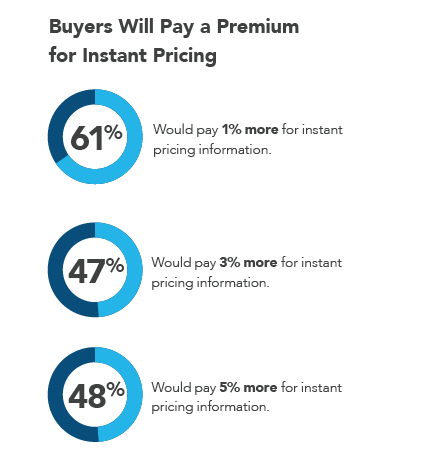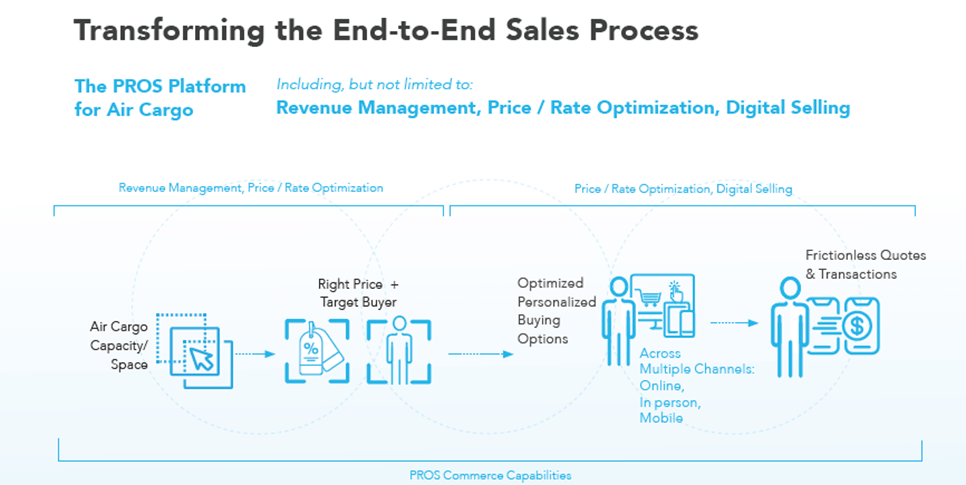Competitive strategies in the digital era are based on creating an exceptional, differentiating buying experience. This paper explores this challenge and proposes a framework of how air cargo companies can successfully transform their end-to-end sales process using AI-powered insight to build value-based customer relationships by delivering instant, personalized offers with personalized prices, providing a frictionless online and offline buying experience.
The Current Reality
The air cargo industry has been facing significant challenges in recent years. The rapid pace of technological change and rising customer demands are making it abundantly clear that legacy systems can no longer keep up. Air cargo carriers face mounting pressure to deliver complex quotes within tight timeframes, maintain competitive pricing, and protect profit margins in an increasingly dynamic market. Static tools like spreadsheets simply can’t meet these demands.
Digital transformation is no longer a choice—it’s a necessity.
The air cargo sector handles
over $8.3 trillion worth of goods annually, accounting for more than 33 percent of global trade by value. With such a significant economic footprint, digital transformation has the potential to reshape the entire ecosystem. However, the window for change is shrinking, as competitors who adopt advanced AI systems gain rapid market advantages.
Tariffs further complicate the landscape, impacting costs, supply chains, and pricing strategies. To navigate these challenges effectively, air cargo companies must embrace digital tools and data-driven approaches to manage risks, optimize pricing, and stay ahead in an unpredictable trade environment.
The uncertainty of the market, along with the tremendous changes and demands that air cargo leaders need to respond to, are what lies at the heart of the digital transformation imperative. Without digitization and the help of Artificial Intelligence (AI), air cargo carriers will find their industry ever more demanding as the pace of change continues to accelerate, and as the world becomes increasingly interconnected.
Digital transformation – the unlocking of the power of digital technology to make businesses more reactive to customer needs, more agile in response to market changes, and able to deliver a superior customer experience – is now a top priority for air cargo companies. The problem is: where to focus?
The problem is: where to focus?
eCommerce is Changing the Air Cargo Industry
Air cargo sales are going digital. Forwarders and shippers want to create quotes online with available routing offers, and the capability to book a dynamic rate with their carriers.
To enable this experience, carriers need a real-time and integrated quoting, pricing, and revenue management platform that accepts inputs from market conditions and other carriers to influence the rates and routes available for shipments.
Air cargo carriers must utilize both dynamic pricing and revenue management practices to optimize spot/adhoc network revenue. A critical revenue management challenge for air cargo is determining the optimal amount of allocation of available capacity for spot bids and charging the best possible daily float rate.
Speed is Everything
When responding to requests, especially to spot bids, speed is everything. Clearly, the current way of requiring shippers to send bids by email or by calling and telling them, “I will get back to you as soon as possible,” will no longer work. Shippers typically have a price range that will work for them, and any price within that range is likely to be accepted. The haulers, freight forwarders, operators, and all other air cargo companies able to offer the first acceptable price often win.
In fact, a value capture study conducted by PROS showed a 50.2% increase in win rates when such a price was submitted before competitors. Recent research shows that B2B buyers want the speed and convenience of their B2C experiences, and they’re willing to pay a premium for it.
Allotment planning and allocations by the stations is an arduous process for most carriers. Time is typically spent with manual data gathering tasks, resulting in little time spent analyzing profitable allocations and forward-looking planning. Artificial Intelligence (AI) and streamlining of the allocation granting process can increase efficiencies and gain more revenue for carriers.
Carriers that use machine learning to determine their optimal rates for both spot deals and allocations ensure revenue is optimized for each and every booking. To maximize revenue per flight, air cargo carriers need a modern platform for quoting, pricing science, and revenue management.
The value capture study also shows that shippers are willing to pay a small premium to get quotes faster, so they can conduct their business faster.
Pricing to Win
Instead of being able to focus on winning business, sales is bogged down with email correspondence and quotes that require manual approval. For many air cargo companies today, they lack a seamless omnichannel pricing process that connects both sales and revenue management strategies. This disconnect between sales, pricing, and revenue management leads to the possibility of money left on the table for each and every deal.
Additionally, existing cargo revenue management systems are complicated and do not serve the needs of all parts of the cargo business, including sales and pricing, resulting in underperformance. The lack of integration with other systems and data sources results in poor forecasting and complicated IT setups.
A single source of pricing truth is crucial, so that sales can manage pricing across all channels. This allows for centralized rate rules and access criteria with complex dynamic price rules, instant analysis and visibility into the impact of price changes (scenario planning), and global strategy and vision in all quotes, while simplifying administration of price management and approvals.
The Smart Investment for Air Cargo Companies
The smart investment that works in both lean and boom times is to invest in capabilities that improve return on assets already owned by improving revenue management, the allocation of capacity based on customers’ willingness-to-pay, and the overall management of demand through better pricing.
This investment almost always leads to significantly more revenue; it pays off much better than trying to increase the top line at the expense of the bottom line.
As the pace of change in all industries continues to accelerate, and as the world becomes increasingly interconnected, air cargo players will find their industry to be ever more demanding. They have to deliver complex quotes in a very narrow time window, and are expected to bid an accurate price, win business, and protect margins. This is a tall order to expect from static technologies, such as spreadsheets.
How Air Cargo Companies Can Up Their Game
It is critical to recognize that we are now in the era of vast amounts of data, and this trend is only growing.
90% of data we have today was created within the last two years.
This means that there is a massive quantity of data about what customers want to buy, when, and how much they are willing to pay for it. Leading organizations make use of this data to drive demand. Air cargo providers are at a data disadvantage if they continue to rely on static and stale. The bargaining power is clearly in the hands of the shippers.
To get back into the game and win profitable business in an era that demands digital selling and faster delivery at lower costs, air cargo businesses must unlock the power of digital technology.
Yet, air cargo business and technology leaders both face the same problem: where to focus?
3 Actions to Navigate Volatility with Confidence
Air Cargo carriers are focused on creating exceptional customer experiences to drive revenue.
Not only will digitally transforming the end-to-end sales and pricing process lead to healthier margins and increased market share, but it’s a far better defense against market-disrupting competitors than lowering prices to retain customers.
1. Ensure Consistent Customer Experience Across All Buyer Touchpoints
Customers can, and will, interact with your business through multiple channels, so it is imperative to support the buyers ability to move freely between online and offline touch points.
2. Prioritize Cross-Organizational Alignment
Double down on all alignment efforts across marketing, pricing, sales, eCommerce, and support processes to better understand your customers needs and ensure you offer the right product at the right price for each customer. These functional areas are critical to driving an improved sales process.
This requires building a consistent, data-driven view of your customers and your product and pricing data, as well as selling workflows.
3. Leverage Technology to Improve Sales & Pricing Processes
Prioritize systems that are cloud-first with modern, flexible architectures designed for scalability and reusability that prepare your business for delivering intelligent and personalized experiences.
By focusing on key buying and selling capabilities, you can reuse these capabilities in your current selling channels and whatever selling channels you choose to activate in the future.
The Game Changers: Artificial Intelligence and Machine Learning
The volumes of data, and the speed at which that data changes, have outstripped human capacity. Businesses must now lean on the power of machine learning (ML) and Artificial Intelligence (AI), to consume, evaluate, and extract insight from the market and customer data.
Digital transformation is about utilizing AI powered systems to handle hundreds or even thousands of complex quote requests and complex pricing data, and return the optimal price in the right channel at the right time.
With PROS AI-powered solutions, air cargo carriers can utilize Capacity Aware Optimization (CAO) to estimate the opportunity cost of capacity, helping to adjust prices dynamically, prioritize high-value customers, and maximize revenue.
With AI and ML doing the heavy lifting, air cargo professionals can bring more value by using their industry knowledge to identify new selling opportunities for their companies, develop new relationships with other partners and channels, and work on more lucrative, longer-term contracts.
The PROS Impact
For more than 30 years, PROS has helped over 100 Origin and Destination transportation companies from various segments, including air cargo, win profitable business in an era that demands selling through digital channels. Rather than building a series of unintegrated tools, PROS provides a single, dynamic, scalable, AI-powered platform enabling air cargo companies to build value-based customer relationships by delivering instant, personalized offers with personalized prices, providing a frictionless online and offline buying experience.
The air cargo industry has demonstrated impressive growth, generating almost twice as many quotes and booking nearly three times as much with PROS solutions.
In addition, quotes requiring approval reduced from 80% to 50%, and there was a 75% reduction in email correspondence needed for approvals, freeing capacity to further develop business.
With the PROS Platform, Air Cargo Companies can:
GAIN REAL-TIME, AI-POWERED BUSINESS INSIGHT
Identify targets for margin and price opportunity, quickly adjust prices for all products and customers, and bring those opportunities in line with optimal pricing strategies, market-relevance, and competitive pricing.
Help sales teams place their bets by giving them unprecedented personalized AI-based insight into their customers and markets, identify whitespace organic growth opportunities, risk of churn based on transaction behavior, and cross-sell and upsell recommendations across customers, products, and sales territories.
Gain complete visibility from List Price to Pocket Margin, while gaining insight into period-over-period trends to identify price, volume, mix, customer attrition/acquisition issues to execute and validate strategies.
OPTIMIZE AND ENABLE REAL-TIME PRICING
Manage, optimize, and update prices dynamically and automatically with a system that is responsive to real-time changes, including data from various indexes, costs, tariffs, competition, inventory, supply and demand history, customer tier, region, capacity, business unit strategies, customer behaviors, etc.
Fight downward pricing pressure by providing sales with personalized recommendations and guidelines based on their customer’s willingness-to-pay and your pricing strategy.
Deliver the right price to your ERP, CRM, and eCommerce systems with integrated availability and unmatched performance globally by evaluating the sequence to grab the right price across contracts, quotes, promotions, and list prices.
PROVIDE A FRICTIONLESS BUYING EXPERIENCE BOTH ONLINE AND OFFLINE
Improve customers’ digital experience by delivering tailored searches, real-time online prices, personalized recommendations, seamless product catalogs, and where appropriate, include contract/ negotiated pricing.
Accelerate sales team’s quoting process to quickly respond to large RFPs and easily generate complicated quotes and price agreements with thousands of products through guided workflows and streamlined mobile approvals, integrated with existing ERP, CRM, and eCommerce systems.
Automate the creation, analysis, and amendments of sales agreements, renewals, extensions with rebates, and terms & conditions through a harmonized platform that ensures consistency regardless of what channel customers engage through.
Solutions in Action
The PROS Platform delivers an integrated solution that transforms and improves every buying and selling interaction through robust pricing, selling, and revenue management capabilities. It is scalable, secure, and highly-performant, enabling businesses to analyze customer and market data to optimize and personalize every offer delivered through any sales channel.
PROS HAS ENABLED AIR CARGO COMPANIES AROUND THE WORLD TO:
- Price strategically and offer greater flexibility in incentives
- Centralize customer pricing management and automate its reward program, so analysts can shift their focus from administrative activities to strategic price management
- Gain greater flexibility in reward programs driving higher volume
- Obtain targeted price guidance to increase revenue uplift
OTHER BENEFITS:
- Margin uplift
- Grow your business (revenue uplift)
- Improve network efficiency
- Increased customer loyalty
- Better customer relationships
- Enhanced revenue growth
- Smarter pricing decisions
- Digital transformation
- Elimination of manual processes (move towards streamlined processes)
- Faster quote turnaround time (bid responses)
- Smarter pricing and payable decisions
By enabling them to provide frictionless online and offline buying experiences, PROS drives growth and improves profitability for air cargo companies.
Lufthansa Cargo’s Online Sales Pick Up Double-Digit Growth
With accelerated quoting comes greater productivity. Where a quote once took emails and phone calls, there is now a new eCommerce quoting platform, through which Lufthansa Cargo has drastically improved and accelerated the quoting process, realizing double-digit growth in online sales in just a few months.
“PROS is an important partner in our digital transformation,” says Lars Mueller, Director of Pricing for Lufthansa Cargo. “With PROS real-time pricing solutions, we’ve revamped how we provide services to customers, while giving our internal teams the tools they need to work with greater speed and efficiency.”
After experiencing a surge in demand, this cargo airline within one month was able to generate twice as many quotes and book almost three times as much with PROS solutions.
Cost of the Status Quo
With the rise of eCommerce sales and digital selling channels across all air cargo segments, organizations are facing significant challenges in pricing their services right while managing their payables.
Proper pricing is essential to continue to grow sales and make money while shippers continue to demand faster delivery at lower rates.
All these complexities require air cargo companies to adopt a new way of thinking to be able to analyze how to price their services and win profitable new business.
Continuing to rely on slow, inaccurate, manual processes is having a direct impact on productivity and revenue. These manual processes lead to unnecessary over discounting, inconsistent customer experiences, and significant time wasted on lengthy processes and unnecessary tasks, often leading to errors.
Spreadsheets were undoubtedly a significant leap in productivity and accuracy from paper and pen. Today, once more, air cargo companies have to accept the limitations of spreadsheets and move to a new level of productivity and accuracy-based AI insight.
PROS RESULTS
PROS customer data shows that air cargo companies without a dynamic, scalable platform for digital commerce leak about 2% of their revenue.
With PROS, air cargo companies achieve an average of:
- 1-3% impact on profit
- 2-5% impact on win rate
- 20-40% impact on productivity
How much is the status quo costing you?
Let’s get together to transform your end-to-end sales process.



